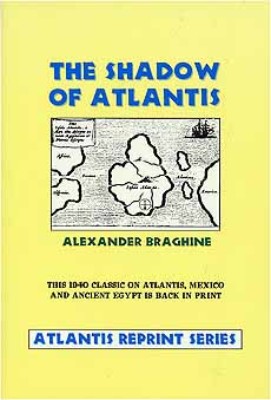Alexander Braghine
(red) Im angelsächsischen Sprachraum durch sein Hauptwerk "The Shadow of Atlantis" (Dutton, New York, 1940) recht bekannt geworden, ist Col. Alexander Pawlowitsch Braghine (1878-1942), dessen Atlantis-Buch (Abb. 1) zwar auch ins Französische [1], nicht aber ins Deutsche übersezt wurde, hierzulande nur wenigen Kennern, Insidern und Enthusiasten der Atlantisforschung ein Begriff.
is well known for his book[156] on Atlantis, which he considers to have been the original homeland of many of the tribes of South America.
"He attributes the destruction of Atlantis to the consequences of at least one close encounter between Earth and Halley’s Comet, during the Holocene period, on 7. Juni 4015 v. Chr. He maintains that this intrusion upset the orbits of Earth and Venus causing worldwide destruction. Many of Braghine’s catastrophist ideas are to be found in Immanuel Velikovsky’s later books without any reference to him. Braghine on the other hand was quite willing to acknowledge any use by him of other writer’s work. Some have explained Velikovsky’s omission as being the result of perceived racism on the part of Braghine."
Braghine in his The Shadow of Atlantis mentions a tribe of white-skinned ‘Indians’ called Paria in a region of Venezuela called Atlan. He claims that their legends refer to them having an original homeland beyond the ocean that that been destroyed in a terrible cataclysm. However I have been unable to find any other reference to this tribe apart from Frank Joseph[104] who locates it in the Apure region between the Orinoco River and its tributary, the Apure. Braghine was also published in French [157].
Sprague de Camp lists[194] a series of errors in Braghine’s book, finishing with the ominous remark that ‘you believe Colonel Braghine at your peril.’
However, David Hatcher Childress does not shrink from correcting[620p270] the mistakes made by de Camp in his critical attack.
Quelle: Tony O’Connell, in: Atlantipedia.ie unter: Braghine, Col. Alexander Pavlovitch, 5. Juni 2010
"Erstmals 1940 veröffentlicht, ist The Shadow of Atlantis einer der großen Klassiker der Atlantisforschung. The Shadow of Atlantis amasses a great deal of archaeological, anthropological, historical and scientific evidence in support of a lost continent in the Atlantic Ocean. Braghine covers such diverse topics as Egyptians in Central America, the myth of Quetzalcoatl, die Sprache der Basken und ihre Verbindung mit Atlantis, the connections with the ancient pyramids of Mexico, Egypt and Atlantis, das plötliche sudden demise der Mammuts, Riesen-Legenden über Riesen und vieles mehr.
Braghine war Linguist und widmet einen Teil seines Buches darauf, alte Sprachen nach Atlantis zurückzuverfolgen, auf das Studium wenig bekannter Inschriften in Brasilien, auf Sintflut-Mythen und die Zusammenhänge zwischen alten Sprachen.
Braghine takes us on a fascinating journey in search of Atlantis. The myth of a sunken continent is examined in the light of archaeological and scientific evidence and the echoes of Atlantean civilization are tracked through space and time.
Quelle: One Heart Books, unter: The Shadow of Atlantis - Colonel Alexander Braghine (Übersetzung ins Deutsch durch Atlantisforschung.de)
Table of Contents
Preface
I. Plato's Dialogues
II. The Hypotheses of A. Schulten and Berlioux
III. The Seismological Argument
IV. The World-Catastrophes
V. The Theory of Adhemar
VI. The Origin of the Aryan Culture
VII. The Carians
VIII. The Etruscans and Pelasgi
IX. The Semites and their Prehistoric Migrations
X. The Origin of the Egyptian Culture
XI. The Great Pyramid
XII. The City of Teotihuacan
XIII. The Excavations in Ecuador
Postscriptum
A Fantastic Picture of the Catastrophe of Atlantis
Bibliography
Anmerkungen und Quellen
- ↑ Siehe: L’énigme de l’Atlantide (Payot, Paris, 1939)
Bild-Quelle
(1) Quelle: One Heart Books, unter: The Shadow of Atlantis - Colonel Alexander Braghine

